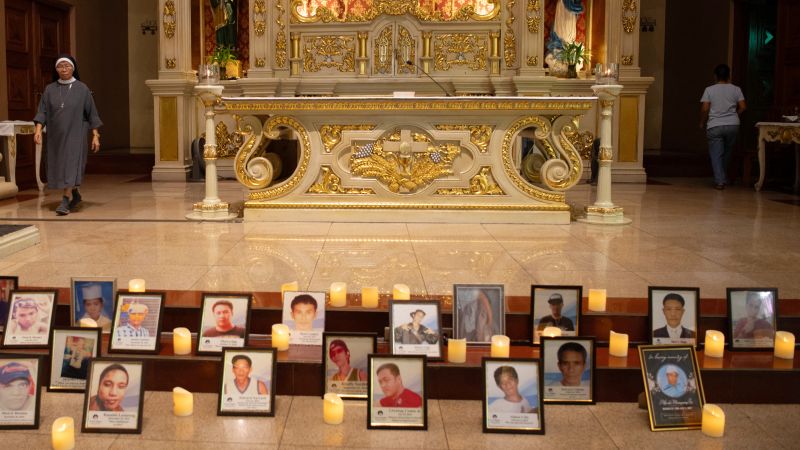Duterte Drug War: ICC, Families' Last Hope?
Editor’s Note: The International Criminal Court's (ICC) investigation into the Philippines' "war on drugs" intensifies, offering a glimmer of hope for families seeking justice.
Why This Matters
The Philippines' "war on drugs," launched under President Rodrigo Duterte, resulted in thousands of deaths. While the government claims these were legitimate police operations, human rights groups and international bodies allege widespread extrajudicial killings. This article examines the ICC's role, the families' pursuit of justice, and the broader implications of accountability for state-sponsored violence. Keywords: Duterte drug war, ICC investigation, extrajudicial killings, Philippines human rights, accountability, international justice.
Key Takeaways
| Point | Summary |
|---|---|
| ICC Investigation | The ICC is investigating alleged crimes against humanity. |
| Families' Pursuit of Justice | Victims' families seek accountability and reparations through the ICC. |
| Challenges to ICC Jurisdiction | The Philippines' withdrawal from the Rome Statute poses challenges. |
| International Pressure | International pressure mounts for justice and accountability. |
| Implications for Future Governments | Sets a precedent for accountability for future governments. |
Duterte Drug War: A Legacy of Violence
The "war on drugs" launched in 2016 under President Rodrigo Duterte has left an indelible mark on the Philippines. The government's official death toll is significantly lower than independent estimates, which range into the tens of thousands. The killings, often characterized by summary executions and a lack of due process, have devastated countless families. The pervasive culture of impunity fueled by the administration's rhetoric only deepened the crisis.
Key Aspects of the Drug War
- Scale of Killings: The sheer number of deaths constitutes a significant human rights crisis.
- Lack of Due Process: Alleged perpetrators rarely face consequences, fostering a climate of fear.
- Government Rhetoric: Duterte's inflammatory statements seemingly encouraged violence.
- Impact on Communities: The drug war disproportionately affected marginalized communities.
- International Condemnation: The killings drew widespread international condemnation.
Detailed Analysis: The ICC's Role
The ICC's investigation represents a crucial step towards accountability. While the Philippines withdrew from the Rome Statute, the ICC maintains jurisdiction over crimes allegedly committed while the country was a member. The investigation focuses on whether crimes against humanity were committed during the drug war. The challenge lies in gathering sufficient evidence and overcoming obstacles like witness intimidation and lack of cooperation from Philippine authorities.
Interactive Elements
The Victims' Stories: Seeking Justice Through the ICC
The ICC investigation offers a critical pathway for victims' families to seek justice. Many have suffered immense loss and continue to live with trauma. Their testimonies, often delivered in the face of immense personal risk, are vital to the ICC's investigation. Factors like fear of reprisal, lack of resources, and navigating a complex legal system present significant hurdles.
Challenges to Accountability: Impunity and Political Will
Despite the ICC investigation, achieving accountability remains a significant challenge. Political will within the Philippines is crucial for effective cooperation with the ICC. Resistance from government officials and potential manipulation of the legal process are considerable obstacles. The legacy of impunity risks hindering the pursuit of justice and reconciliation.
People Also Ask (NLP-Friendly Answers)
Q1: What is the Duterte drug war?
A: The Duterte drug war refers to a controversial anti-drug campaign launched in the Philippines under President Rodrigo Duterte, characterized by a high number of extrajudicial killings.
Q2: Why is the ICC investigating the drug war?
A: The ICC is investigating allegations of crimes against humanity, including widespread extrajudicial killings, committed during the Philippines' "war on drugs."
Q3: How can the ICC benefit the victims' families?
A: The ICC offers a pathway for victims' families to seek justice, accountability for perpetrators, and potential reparations for their losses.
Q4: What are the main challenges to the ICC investigation?
A: Challenges include lack of cooperation from the Philippine government, witness intimidation, and navigating a complex legal process.
Q5: How can I support the victims of the drug war?
A: You can support human rights organizations working on this issue, advocate for accountability, and spread awareness about the human rights violations.
Practical Tips for Understanding the ICC Investigation
- Follow reputable news sources: Stay updated on the ICC investigation through credible international news outlets.
- Learn about international law: Understand the Rome Statute and the ICC's jurisdiction.
- Support human rights organizations: Donate to or volunteer with organizations advocating for victims' rights.
- Engage in advocacy: Contact your government representatives to urge support for the ICC.
- Educate yourself and others: Share accurate information about the drug war and its implications.
- Support victims' families: Consider donating to organizations providing support to those affected.
- Follow the ICC's website: Stay informed about the progress of the investigation.
- Amplify victims' voices: Share their stories and testimonies responsibly to raise awareness.
Summary: The ICC's investigation into the Duterte drug war represents a significant step towards accountability for the thousands of lives lost. While challenges remain, the pursuit of justice offers hope for victims' families and sets a precedent for future governments.
Closing Message: The fight for justice is far from over. Will the international community continue to pressure the Philippines for accountability? What lasting impact will this investigation have on the pursuit of human rights?
Call to Action: Learn more about the ICC investigation and support organizations working to bring justice to the victims of the Duterte drug war. Share this article to raise awareness and encourage further action.

